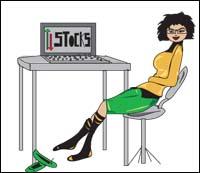I’m writing this at the tail end of 2008, but you won’t be reading it until 2009. That’s a bit strange, isn’t it? But it allows me to make a point at the end of one year that hopefully will carry you into the next.
This has been the most disastrous year in memory financially and investment-wise for most of us. I’m assuming you are included in this, unless you just happened to put your money somewhere in 2008 that didn’t lose its value. If you did, you should be writing these articles, not me. Because my husband and I lost a bundle.
Oh, we’re not going to the poorhouse or begging for food scraps at the back door of California Pizza Kitchen, but our net value has certainly been reduced. And we’re retired, so we don’t have an opportunity to recoup those losses. We just have to “count it as a vegetable and move on,” as my Weight Watchers friend says, “You made a mistake, accept it, get over it and get going with the rest of your life.”
So at the end of this frustrating and disappointing year, I’d like to recommend a few tips for 2009, tips I hope you will take to heart and employ in your future, no matter what your financial situation is.
First, do some research to find two or three good stocks that should do well in the coming year. If President Obama, for example, is going to be able to push through an infrastructure program for the U.S. to spruce up roads and bridges and such and to give jobs to people, which companies (and stocks) would stand to profit from such a venture? Caterpillar?
John Deere? Cement companies? Now, you’ve learned a great lesson in 2008: there’s really no way to pick with certainty stocks that will go up, because the economy is subject to so many outside forces that can topple it. But it never hurts to make intelligent assessment and decisions based on good, solid research. But don’t overdo it; a few stocks in 2009 will do fine. Don’t overload.
Second, keep some cash back. Who knows what’s going to happen in the coming months? So it would be prudent to hold back some cash just in case there are some good buys out there in March or April. Instead of spending your entire cash amount at the beginning of January just nibble. Buy half the amount of shares you would like to wind up with. Then wait a while, and buy more.
Third, watch the portfolio you build more carefully than you have in the past, especially while the world sorts itself out, we install a new President, and world affairs reveal themselves. In the past, it was enough to check your stocks perhaps once a month; in fact, there were many professionals who advocated a hands-off stance. Not now. You have to monitor someone who is recovering from a terrible disease a lot more closely than someone who has been healthy. Your portfolio – and mine – has been sick. It’s imperative that we be careful and observant with what we own now more than ever.
Fourth, set perameters. If you buy a stock, what percentage of loss of the value of that stock would you be comfortable with? Ten percent? Twenty percent? Whatever you decide, set this as a mental sell so if it hits that percentage of loss, you have already made your decision about selling it. Unemotional: this is the word for the way you are going to relate to your new stock portfolio in 2009. You’re going to make decisions based on facts and cool-headed logic, and you’re not going to let losses get the better of you in the coming year.
Fifth, and finally, enjoy life. The stock market is not going out of business, you need to stop fretting about your losses and get on with your life. It does you no good at all to dwell on what happened to your assets in 2008. Don’t be telling horror stories to people into September of 2009 of how awful 2008 was to your portfolio. No one wants to hear it. They have their own horror stories to tell. Instead, be thankful for the good aspects of your life that are still intact, and wake up each morning looking forward to what that day has to offer. Your mental health is far more important than your assets any day of the year.
And Happy New Year!
Rita is a successful private investor and leads four investment clubs where she has taught hundreds of women about stocks and finances. She is the chairperson of the board of an international non-profit organization and devotes much of her time to a variety of charity work.

